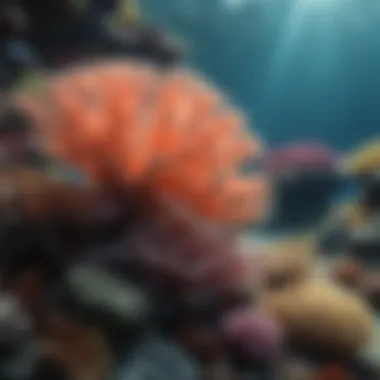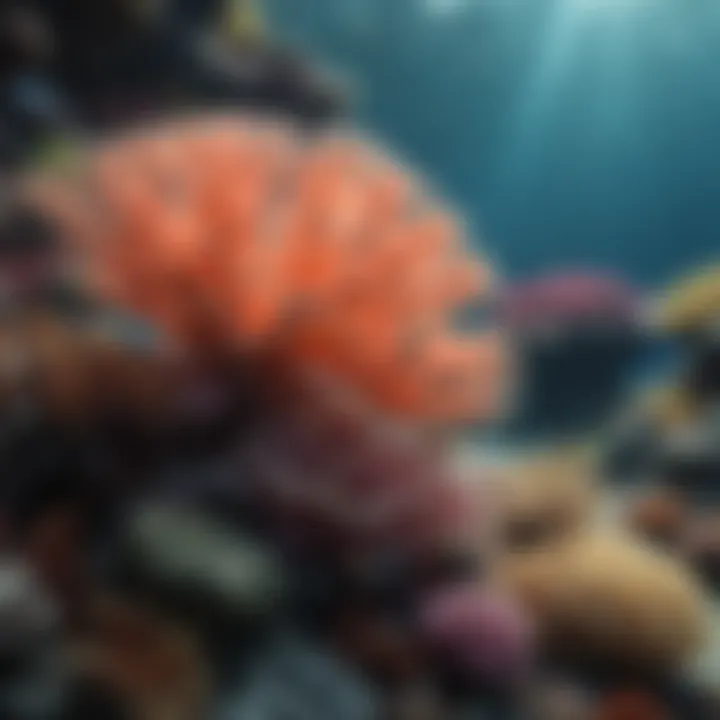Ocean Health Issues: A Comprehensive Examination


Intro
The health of our oceans is a pressing issue that requires immediate action. They play a critical role in regulating Earth’s climate and supporting a vast array of life. However, the degradation of marine ecosystems due to pollution, climate change, and overfishing poses alarming threats. Understanding these complexities is essential for anyone who is passionate about ocean conservation.
Techniques and Tips
Addressing ocean health issues starts with informed decision-making by individuals and communities. Here are some essential techniques and tips.
Skill Development
- Educate Yourself: Familiarize yourself with the key issues surrounding ocean health. Resources such as Wikipedia and Britannica offer credible information.
- Engage with Local Organizations: Many communities have environmental organizations that focus on ocean conservation. Participate in workshops and webinars to learn from experts.
- Stay Updated on Policy Changes: Marine policies often shift, influenced by public opinion and scientific research. Keep track of these changes as they impact conservation efforts.
Practical Techniques
- Reduce Plastic Use: Plastic pollution is a widespread issue. Opt for reusable bags, bottles, and containers to limit your contribution.
- Promote Sustainable Seafood: Choose seafood that is sustainably harvested. Programs like Seafood Watch provide useful guides on selecting ocean-friendly options.
- Engage in Community Cleanups: Participate in local beach clean-up events. Every action counts and helps raise awareness within your community.
Common Mistakes to Avoid
- Ignoring Scientific Research: Sometimes it can be easy to dismiss scientific findings. Always consider peer-reviewed studies when forming opinions about conservation practices.
- Assuming Individual Actions Don’t Matter: Many people think that one person's efforts are insignificant. Collective change begins with individual actions and can inspire others.
The Importance of Technology in Conservation
Technological advancements offer new ways to address ocean health challenges. Innovations in marine monitoring equipment, for instance, provide real-time data on ocean conditions. These tools aid researchers and conservationists in formulating effective strategies.
Ending
A comprehensive understanding of ocean health issues empowers us to make informed choices. Sustainable practices can mitigate the effects of pollution, climate change, and habitat destruction. We all have a role to play in preserving the intricate balance of our marine ecosystems. Education, community involvement, and effective policies are essential components in this ongoing fight for oceanic well-being.
Prelims to Ocean Health
The health of our oceans is a pressing concern, intertwined with the survival of countless species and the well-being of humanity. Oceans govern our climate, serve as a critical resource for food, and hold unparalleled biodiversity. Yet, this essential element of Earth's ecosystem is under threat from human actions. Understanding ocean health means recognizing the complex network of relationships among marine species, ecosystems, and human impact.
Defining Ocean Health
Ocean health encompasses several factors that determine the vitality and sustainability of marine environments. It involves the assessment of water quality, ecological balance, and the resilience of marine life. Key indicators include the presence of pollutants, biodiversity levels, and the condition of habitats such as coral reefs and sea grass beds. To define ocean health is to quantify the balance within these systems; a healthy ocean displays robust biodiversity, minimal pollution, and stable ecosystems. When these factors are disrupted, the ramifications extend beyond marine life, affecting climate, economies, and human health.
Importance of Healthy Oceans
Healthy oceans provide numerous benefits, both ecological and socioeconomic. They are indispensable for supporting the livelihoods of millions of people worldwide, particularly in coastal communities reliant on fishing and tourism. Ocean health is also linked to climate regulation. The capacity of oceans to absorb carbon dioxide helps mitigate climate change, protecting not only marine life but terrestrial environments as well.
Moreover, oceans contribute to global food security. Healthy fish populations are critical for nutrition in many regions. A decline in fish stocks threatens food availability and increases competition over dwindling resources.
Certainly, beyond nature's roles, healthy oceans foster economic stability. Tourism, especially in regions known for rich marine ecosystems, thrives with vibrant and biologically diverse oceans. Activities such as snorkeling and diving attract thousand of thrill-seekers each year, celebrated in locations like the Great Barrier Reef and the Caribbean.
"Healthy oceans are a cornerstone of our planet’s climate and our economies.
Recognizing the importance of ocean health leads to actionable insights. Initiatives to maintain and enhance ocean integrity must be prioritized. Individuals, communities, and governments hold collective responsibility for safeguarding these vital ecosystems, both for the present and future generations. By driving awareness and promoting sustainable practices, a healthier ocean may still be achievable.
Pollution: A Major Threat
Pollution remains one of the most pressing threats to ocean health. The impact of various pollutants continues to escalate, affecting marine ecosystems profoundly. Understanding the types and sources of pollution is crucial for addressing this complex issue. It facilitates the implementation of effective strategies to mitigate the deteriorating conditions of our oceans. A thorough examination reveals that pollution is not just an environmental concern; it intersects with human health, marine biodiversity, and the overall functionality of oceanic systems.
Types of Pollution Affecting Oceans
Plastic Pollution
Plastic pollution represents a significant challenge for ocean health. It encompasses every type of plastic waste that finds its way into marine environments. One key characteristic of plastic pollution is its durability. Plastic does not decompose in a matter of years; it can persist for centuries, breaking down into microplastics. This unique feature poses risks to marine life, as animals often ingest these particles mistaking them for food. The ongoing discussion surrounding plastic pollution emphasizes its harmful impact, from entanglement of marine species to the toxic effects of chemicals leaching from plastics.
Nutrient Pollution
Nutrient pollution primarily arises from agricultural runoff enriched with fertilizers. It leads to excessive nitrogen and phosphorus entering ocean waters. A crucial aspect of nutrient pollution is its ability to fuel algal blooms. These blooms can create dead zones, areas devoid of oxygen, which suffocate marine life. Addressing nutrient pollution is beneficial as it also helps in maintaining the balance of marine ecosystems. Efforts to reduce this type of pollution encourage sustainable farming practices, which are essential for both ocean health and agricultural productivity.
Chemical Pollution
Chemical pollution consists of various hazardous substances released into oceans. These include heavy metals, pesticides, and pharmaceuticals. One of the key characteristics of chemical pollution is its complexity; some chemicals bioaccumulate in the marine food web. This leads to harmful effects on both marine organisms and humans who consume contaminated seafood. The unique features of chemical pollution lie in its systemic impacts across the food chain. Regulation of chemical discharges presents a significant advantage in improving ocean health by minimizing the toxins entering marine ecosystems.
Sources of Ocean Pollution
Industrial Discharge
Industries often release a variety of waste products directly into nearby water bodies. Industrial discharge contributes heavily to ocean pollution. The key characteristic of this type of pollution is the diversity of toxic substances, including heavy metals and organic compounds. This makes it a significant focus in discussions about ocean health. One unique feature of industrial discharge is that it can be monitored and regulated through existing environmental laws, providing a pathway to reduce its impact significantly.


Urban Runoff
Urban runoff occurs when rainwater flows over impervious surfaces, such as roads and rooftops, picking up pollutants along the way. This source of pollution is growing as urban areas expand. A prominent aspect of urban runoff is its ability to carry diverse pollutants, from oils and heavy metals to organic debris. The unique feature of urban runoff is its episodic nature; pollutant levels can spike significantly after heavy rainfall. Implementing effective stormwater management practices can be advantageous in reducing the amount of pollutants entering the oceans.
Marine Transport
Marine transport constitutes a significant source of ocean pollution through oil spills, ballast water discharge, and other forms of waste. One of the key characteristics of marine transport pollution is its often international scale, complicating regulatory efforts. The unique aspect of marine transport pollution includes the potential for catastrophic events, such as oil spills, that have immediate and devastating effects on marine ecosystems. Stricter regulations and technologies can help mitigate the adverse impacts of marine transport pollution on ocean health.
Climate Change and Its Effects
Climate change represents a significant threat to ocean health, profoundly influencing marine ecosystems and the services they provide. The consequences of climate change are far-reaching, impacting everything from ocean temperatures to the chemistry of seawater. Understanding these effects is critical for assessing the future of marine life and ecosystems, as well as the human communities that rely on them.
Rising Ocean Temperatures
Rising ocean temperatures result from the absorption of excess heat from greenhouse gases. This warming has numerous ecological repercussions. Warmer waters can lead to coral bleaching, a phenomenon that threatens the very foundation of marine biodiversity. Coral reefs, home to countless marine species, are already experiencing severe stress due to temperature fluctuations. Moreover, higher sea temperatures can affect fish distributions, pushing them toward cooler waters and altering traditional fishing grounds. When fish relocate, the consequences ripple through the entire ecosystem, affecting predator-prey relationships and the livelihoods of coastal communities.
Ocean Acidification
Ocean acidification is another direct consequence of climate change, occurring when increased carbon dioxide levels are absorbed by seawater. The resulting chemical reactions lower the pH of ocean waters, making them more acidic. This process poses a serious threat to calcifying organisms such as mollusks, corals, and certain species of plankton. These organisms are essential components of marine food webs. A decline in their populations can lead to significant disruptions in oceanic ecosystems.
Furthermore, acidification can reduce the ability of marine ecosystems to sequester carbon, exacerbating the problem of climate change. Harnessing an understanding of ocean acidification is vital for future conservation efforts, as it highlights the interconnectedness of climate issues and marine ecosystems.
Impact on Marine Species
The combined threats of rising temperatures and acidification generate considerable stress on marine species. Many species face challenges adapting to rapid environmental changes, leading to increased mortality rates and disrupted reproductive cycles. Some species may thrive, benefiting from warmer conditions, but many more are poised to decline and potentially face extinction. Fish species are particularly vulnerable; changes in their habitats can affect growth rates, reproductive success, and overall population health.
As marine biodiversity diminishes, the resilience of ocean ecosystems weakens. This reduction in resilience not only affects marine life but also the economies that rely on these resources.
"We must recognize the urgency of combating climate change if we wish to protect our oceans and sustain the communities that benefit from them."
To emphasize the severity of these challenges, stakeholders must initiate actionable responses to address climate change's impact on oceans effectively. This includes promoting sustainable fishing practices, investing in marine conservation, and advocating for strong policies that mitigate climate change at the global level.
As we turn our attention to these pressing issues, it is clear that the health of our oceans is intrinsically linked to the broader challenges of climate change.
Overfishing and Its Consequences
Overfishing represents a critical challenge to the health of our oceans. It stems from the desire to meet the growing demand for seafood, resulting in the depletion of fish stocks at an alarming rate. This section will delve into the specific consequences of overfishing, impacting not only marine populations but also the broader ecosystems in which they reside. Understanding this issue is crucial for promoting sustainable fishing practices that can protect marine biodiversity for future generations.
Impact on Fish Populations
The most immediate effect of overfishing is the significant reduction in fish populations. Species such as cod, tuna, and haddock are now in danger. These fish populations struggle to recover due to high exploitation rates that exceed their natural reproductive capacity. Estimates suggest that some fish stocks are at only 10% of their original levels. With fewer fish in the waters, the balance of marine life is disrupted.
Diminished fish populations can lead to a collapse of specific fisheries. For instance, once abundant species may take decades to recover, if they manage at all. The loss of these essential species also affects predator-prey relationships, resulting in declines across various marine organisms.
Ecosystem Imbalances
The consequences of overfishing extend beyond just pulling fish from the sea. When fish populations decline, it can lead to imbalances in marine ecosystems. For example, the absence of certain species may allow other fish to proliferate, which can change the entire structure of the food chain. This disruption can lead to increased competition among species for food and habitat.
Moreover, targets of overfishing often include key species that play critical roles in maintaining ecological balance. For example, catching too many herbivorous fish can lead to algal blooms, adversely affecting coral reefs and other marine systems. Such imbalances jeopardize the entire ecosystem, affecting not just the species involved but the habitats they support.
Sustainable Fishing Practices
To combat the issues arising from overfishing, sustainable fishing practices are essential. These practices are designed to ensure that fish populations remain healthy and ecosystems are preserved. Methods include implementing catch limits, using selective gear to minimize bycatch, and practicing rotational fishing techniques.
Here are several key strategies for sustainable fishing:
- Establishing Quotas: Limiting the amount of fish that can be caught helps prevent overexploitation. This requires scientific assessments to set appropriate levels based on fish population data.
- Marine Protected Areas: Restricting fishing in designated areas allows ecosystems to recover and thrive without human interference.
- Community-Based Management: Engaging local communities in decision-making ensures that the practices suit their needs and that they have a vested interest in maintaining their local marine resources.
"Sustainable fishing is vital not just for fish populations but for the entire marine ecosystem. It requires commitment from governments, industries, and consumers alike to create lasting change."
Habitat Destruction
Habitat destruction represents a critical component of the discussion surrounding ocean health. It refers to the degradation or complete loss of marine ecosystems due to various human activities. Coastal regions, home to diverse species, are particularly vulnerable. Understanding this phenomenon is vital for several reasons, including the preservation of biodiversity and the sustainability of fisheries. The consequences of habitat destruction ripple through marine environments, affecting not only plants and animals but also the people who rely on these ecosystems for their livelihoods.
Coral Reef Degradation
Coral reefs are one of the most biologically diverse ecosystems on the planet, often referred to as the "rainforests of the sea." However, they are suffering significant degradation due to a combination of climate change, pollution, and unethical fishing practices. These vibrant ecosystems support a vast array of marine species. Their loss leads to a decrease in biodiversity, which ultimately destabilizes marine food webs.
Coral bleaching is a direct effect of rising sea temperatures. When stressed, corals expel the symbiotic algae that give them color and essential nutrients. This not only weakens the corals but can also lead to large-scale mortality events. Protecting these vital habitats is paramount, not just for the marine life they support but also for coastal protection and tourism revenue, which heavily depend on healthy reefs.
"Coral reefs contribute to nearly one-third of all marine life, making their conservation critical for ocean health."
Wetland Loss


Wetlands serve as crucial buffers between land and sea, often filtering pollutants and providing habitat for many marine species. They support diverse wildlife and act as nurseries for many fish species which are vital for commercial fishing. However, these areas are being lost at alarming rates due to urban development and industrial encroachment. Deforestation, agricultural expansion, and infrastructure projects contribute to wetland destruction.
The loss of wetlands has dire consequences. It increases flood risks and removes natural filtration systems that help maintain water quality. Additionally, the disappearance of these ecosystems jeopardizes the livelihoods of those who depend on fishing and tourism along coastlines. Strategies for preserving and restoring wetlands are essential in the fight against habitat destruction.
Impact of Coastal Development
Coastal development poses one of the most significant threats to marine habitats. The construction of resorts, urban centers, and industrial facilities alters natural shorelines, leading to erosion and habitat degradation. Mangroves, salt marshes, and other coastal ecosystems often face extensive damage from such projects. As these areas are modified, the species that inhabit them find their homes diminished or entirely destroyed.
Coastal development, driven by economic growth and population expansion, contributes not only to habitat loss but also to pollution from construction and increased runoff. The implications are profound, leading to reduced fish populations and compromised water quality. Policymakers must prioritize sustainable coastal management practices that balance development needs with the protection of marine ecosystems.
All these elements of habitat destruction intertwine, creating a complex narrative regarding the health of our oceans. Understanding each aspect is essential for effective conservation efforts and the development of informed policies to protect these critical zones.
Socioeconomic Implications
Understanding the socioeconomic implications of ocean health is critical. Oceans are not just vast bodies of water; they serve as a resource base for millions of people worldwide. They impact economies, livelihoods, and cultures. This section will address how the health of oceans affects coastal communities and the sustainability of economic activities that depend on marine ecosystems.
Impact on Coastal Communities
Coastal communities rely heavily on healthy ocean ecosystems for their subsistence and economic activities. Fishing provides not only food, but also employment and income. As fish populations decline due to overfishing and pollution, these communities face economic losses. Furthermore, marine tourism plays a significant role in local economies. Healthy coral reefs and diverse marine life attract tourists, which can lead to job creation and revenue generation. However, habitat destruction and climate change threaten these attractions.
The incidence of severe weather events, which are increased by climate change, often devastate coastal areas. Communities must allocate resources for disaster recovery, which detracts from investments in health, education, and infrastructure. Access to clean beaches and fish stocks is also compromised, which impacts both health and culture.
Sustainability and Economic Viability
Incorporating sustainability into marine resource management is essential for long-term economic viability. Unsustainable practices, such as overfishing or pollution, create temporary economic gains but lead to future deficits. Economic models must account for the ecological balance. For instance, promoting aquaculture can alleviate the pressure on wild fish stocks while creating jobs.
Local regulations and international agreements are important tools for ensuring sustainable practices. Effective governance can lead to healthier marine environments and a steady flow of resources for communities. Education plays a role as well; increasing awareness of sustainable practices helps communities make informed decisions.
"Investing in ocean health is an investment in the future of our communities and economies."
The health of our oceans directly impacts the socioeconomic frameworks that support human life along our coastlines.
Conservation Efforts
Conservation efforts play a crucial role in the fight against ocean degradation. These efforts focus on protecting marine ecosystems and ensuring sustainable use of marine resources. By implementing specific strategies, societies can enhance biodiversity, restore habitats, and mitigate human impacts on oceans. Key elements of conservation include establishing marine protected areas, engaging in restoration initiatives, and promoting sustainable fishing practices.
One benefit of robust conservation efforts is the preservation of marine biodiversity. Healthy ecosystems are essential for global ecological balance, supporting both human life and a myriad of marine species. Furthermore, conservation efforts can lead to improved ecosystem services, such as carbon sequestration, which is critical in addressing climate change and its effects. The interconnection between human beings and marine ecosystems emphasizes that conservation is not just an environmental issue but also a socioeconomic one. Therefore, it requires broad community involvement and support from policymakers.
Marine Protected Areas
Marine protected areas (MPAs) serve as designated regions within the ocean where human activity is limited to protect natural or cultural resources. The establishment of MPAs can significantly contribute to ocean health by providing safe havens for marine life to thrive. These areas help replenish fish stocks, restore damaged ecosystems, and bolster resilience against climate impacts.
Research suggests that when marine environments are given time to recover, species diversity increases and populations stabilize. MPAs can also aid in fostering sustainable fisheries by protecting breeding populations, which leads to more productive fishing industries in adjacent areas. However, successful implementation requires strict regulations, enforcement, and ongoing monitoring to ensure these protections are effective.
Restoration Initiatives
Restoration initiatives focus on rehabilitating damaged marine environments, such as coral reefs and mangroves. These initiatives often utilize scientific research and community engagement to pinpoint specific areas in need of recovery. For instance, coral reef restoration projects may involve transplanting healthy corals to degraded areas. Similarly, mangrove restoration can improve coastal defenses against erosion and provide nursery habitats for fish.
The benefits of restoration initiatives extend beyond ecological improvements. They also serve to enhance community resilience against climate change and natural disasters. Effective restoration can lead to increased tourism opportunities, as healthy ecosystems attract visitors seeking recreational activities. Beyond the immediate ecological impact, these projects cultivate awareness about the significance of marine environments, encouraging more individuals to engage in conservation efforts.
"Conservation is not a hobby; it is a crucial responsibility that all societies share to preserve our planetary health and biodiversity."
In summary, both marine protected areas and restoration initiatives stand as pillars in the broader context of conservation efforts. They provide avenues to combat detrimental effects of human activity on ocean health. Addressing challenges in oceanic environments requires not only scientific intervention but also a collective commitment from individuals, communities, and governments.
The Role of Policy and Governance
Governance and policy play a crucial role in managing ocean health. Effective regulation is essential for addressing the multifaceted challenges that marine ecosystems face today. The complexity of issues such as pollution, habitat destruction, and overfishing requires comprehensive strategies that harmonize local, national, and global efforts. Good policies can enforce sustainable practices, promote conservation initiatives, and protect marine biodiversity. Without strong governance frameworks, achieving a healthy ocean is unlikely.
International Agreements
International agreements are foundational to collective action in ocean governance. Treaties like the United Nations Convention on the Law of the Sea (UNCLOS) create a legal framework for nations to cooperate in managing shared marine resources. These agreements often focus on regional marine environments, addressing specific threats such as illegal fishing and pollution.
- Common Goals: They encourage countries to work towards shared objectives, fostering collaboration among nations that depend on healthy oceans.
- Monitoring Mechanisms: Many international agreements include provisions for monitoring compliance and assessing the health of marine ecosystems. This process helps ensure that commitments are upheld.
- Funding Opportunities: These agreements can also open doors to funding for conservation projects. Countries often commit financial resources to bolster international efforts aimed at protecting the oceans.
"International cooperation is essential for the sustainable management of ocean resources, given the vastness and global nature of marine ecosystems."
Local Regulations and Enforcement
Local regulations are equally important in the governance of ocean health. While international frameworks set the stage, it is at the community level where enforcement often takes place. Local governments have the ability to implement targeted regulations that address specific issues within their jurisdictions.
- Tailored Solutions: Local policies can be customized to tackle unique environmental circumstances or cultural practices that impact ocean health. This localized approach ensures that responses are not only efficient but also relevant.
- Community Engagement: Involving local communities in the enforcement of these regulations increases compliance. When communities understand the benefits of protecting marine resources, they are more likely to support and engage in conservation efforts.
- Education and Awareness: Local regulations can also include provisions for public education. This cultivates a culture of stewardship among residents, making the community an active participant in ocean health initiatives.
Ultimately, the interplay between international agreements and local regulations creates a dynamic governance framework. It allows for comprehensive management of ocean issues, ensuring that both broad commitments and localized actions work together to promote a healthy marine environment.


Public Awareness and Education
Raising awareness about ocean health is vital. Understanding the impact of human actions on marine ecosystems can lead individuals and communities to make informed decisions. Education is the cornerstone of this process. When people know the facts, they tend to act with greater responsibility. An informed public can influence policy changes, conservation efforts, and sustainable practices.
Public awareness campaigns can showcase the problems our oceans face. These campaigns can range from local clean-up events to global initiatives. Social media platforms like Facebook and Reddit allow for rapid dissemination of information. Engaging storytelling can amplify these efforts, making the issues more relatable to a wider audience.
Education fosters behavior change. For instance, schools that incorporate ocean health topics into their curriculum can create environmentally conscious citizens. Workshops, seminars, and public discussions further stimulate interest and participation. With better education on marine issues, people are more likely to support legislation aimed at protecting ocean health.
"An informed public is the best defense against further degradation of our oceans."
Role of NGOs
Non-Governmental Organizations (NGOs) play a crucial role in raising awareness and educating the public about ocean health. These organizations often have more flexibility than government entities to innovate and advocate for change. They can conduct research, create educational materials, and promote grassroots initiatives. Many NGOs focus on specific issues, such as plastic pollution or sustainable fishing practices. Their targeted approach can effectively address specific challenges affecting ocean ecosystems.
NGOs often partner with local communities to provide information and resources that can lead to long-term change. They can offer practical solutions and training on how to engage in sustainable practices. This partnership can empower communities to take ownership of their environmental impact.
Community Engagement
Engaging the community in ocean health awareness is essential. Local initiatives can foster a sense of responsibility for nearby marine environments. Programs that involve community members in monitoring local water quality or protecting marine habitats can create stronger connections to the ocean.
Volunteering for beach clean-ups or educational workshops can encourage collective action. This engagement builds a network of informed individuals who care about ocean sustainability. By participating in community-based actions, individuals feel a sense of purpose and connection to the larger mission of ocean conservation.
Ultimately, public awareness and education shape the future of ocean health. By leveraging the strengths of NGOs and fostering community engagement, we can build a movement for positive change in marine ecosystems.
Technological Innovations in Conservation
Technological innovations play a crucial role in addressing ocean health issues. As the biodiversity of our oceans declines, the integration of advanced technology becomes imperative for effective conservation strategies. Utilizing technology can optimize monitoring, enhance data collection, and create innovative solutions for ocean cleanup. These advancements benefit marine ecosystems and generate more accurate communication about the health of our oceans.
Monitoring and Data Collection
Accurate monitoring and data collection are vital for understanding oceanic changes. Technologies such as satellite imagery and underwater drones provide real-time data on ocean conditions. These tools help assess water quality, track pollution levels, and observe changes in marine habitats. Innovations in Artificial Intelligence have allowed researchers to analyze large datasets efficiently. This capability identifies patterns and predicts future trends in marine environments. With precise data, conservation efforts can be tailored to specific regions, greatly enhancing their effectiveness.
Innovative Cleanup Solutions
Cleanup solutions are critical in reversing the damage done to our oceans. Recent innovations, such as the Ocean Cleanup Project, use large barriers to capture plastic debris from ocean waters. These systems continuously operate to collect and remove various pollutants. Furthermore, advancements in bioremediation utilize microorganisms to break down harmful chemicals and reduce waste. These methods showcase the potential of technology to not only clean oceans but also restore ecosystems harmed by human activities.
"Technological advancements offer a pathway to a healthier ocean, balancing human activity with marine conservation."
Incorporating these technologies into conservation efforts fosters a more sustainable relationship with the ocean. As we enhance our understanding through innovative methods, we must also address the underlying issues threatening ocean health. Embracing these advancements is essential for ensuring that our oceans remain vibrant and resilient for generations to come.
Future Directions for Ocean Health
The future of ocean health is a critical topic that cannot be overlooked. As the threats to marine ecosystems continue to escalate, it becomes essential to assess and adapt our strategies for protecting them. This section will focus on the vital need for targeted research and effective policy alignments to address the ongoing challenges facing our oceans. By emphasizing these two elements, we aim to provide insights into potential pathways forward.
Research Needs
One of the foundational steps towards improving ocean health is identifying specific research needs. Understanding how various factors influence marine ecosystems is crucial. This includes detailed studies on
- Climate change impacts on ocean currents and temperature patterns.
- Biodiversity assessments to understand the health of different marine species.
- Ecosystem service valuation, which examines the economic contributions of healthy oceans.
Moreover, integrative approaches that combine technology with traditional ecological knowledge should be prioritized. For example, employing satellite imaging can help monitor coral reef conditions, while collaborating with indigenous communities can enhance the understanding of local ecosystems. Such research initiatives not only provide data but also build a comprehensive knowledge base that can lead to informed decision-making.
Policy Recommendations
Effective policies are paramount in shaping the future of ocean health. Governments must adopt integrated marine management frameworks that address environmental, social, and economic considerations. Key recommendations include:
- Strengthening International Cooperation: Bilateral and multilateral agreements among nations can facilitate better management of shared marine resources.
- Implementing Ecosystem-Based Management: Policies should focus on maintaining the health of entire ecosystems rather than single species to promote long-term sustainability.
- Enhancing Regulatory Measures: Tightening regulations on pollutants entering marine environments can contribute significantly to reducing pollution levels.
- Promoting Public Awareness: Educating the community about the importance of ocean health can galvanize grassroots support for conservation initiatives.
Culmination
In this article, the conclusion serves several critical functions. It acts as a summarization of the discussed issues surrounding ocean health, tying together the complex topics addressed throughout the sections. This not only refreshes the reader's memory but also reinforces the main arguments presented. Emphasizing the intricate relationships between pollution, climate change, overfishing, and habitat destruction is vital for illustrating the current state of marine ecosystems.
The conclusion is important for several reasons:
- Reinforcement of key messages: It solidifies the urgency of addressing the multiple threats to ocean health and the roles various stakeholders must play.
- Highlighting interconnectedness: The issues discussed are not isolated; they interact in numerous ways that affect marine life and human activities.
- Motivating action: It serves to inspire readers to adopt practices that can mitigate damage, stressing that individual and collective actions matter.
Recapitulation of Key Issues
The discussion on ocean health has brought to light multiple concerning issues. Significant points include:
- Pollution: Various types of pollution affect oceans, including plastic, nutrient, and chemical pollutants. Each has unique sources and disastrous consequences for marine ecosystems.
- Climate Change: Rising temperatures and ocean acidification are altering marine habitats, forcing species to adapt or perish.
- Overfishing: Unsustainable fishing practices have led to dwindling fish populations and disruptions in ecosystem balance.
- Habitat Destruction: Activities like coastal development and wetland loss cause irreversible damage to marine habitats, such as coral reefs.
- Socioeconomic Implications: The degradation of marine ecosystems also affects coastal communities and global economies, outlining the need for sustainable approaches.
Call to Action
To safeguard ocean health, it is imperative for individuals, communities, and policymakers to engage in meaningful action. Some suggested steps include:
- Adopting sustainable fishing practices: Requiring compliance with fishing quotas and endorsing catch-and-release methods can significantly alleviate pressure on fish stocks.
- Reducing plastic use: Minimizing single-use plastics and supporting clean-up initiatives can curtail pollution.
- Advocating for policy change: Pushing for stringent regulations on industrial discharge and climate change mitigation can lead to healthier oceans.
- Community involvement: Engaging local communities in conservation efforts enhances awareness, education, and participation in marine protection initiatives.
The preservation of ocean health hinges on collective efforts. With commitment and strategic action, it is possible to reverse some of the damage done and secure a sustainable marine environment for future generations.







